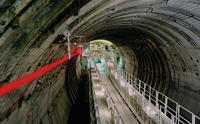-
Police get $500k for sting operation
After participating in federal sting operation that shut down Internet gambling businesses, a local police department in Maryland is receiving a check for nearly $500,000; agents from Anne Arundel Police Department went undercover to assist DHS officials seize millions of dollars in a sting operation; the money comes from a gambling case where federal investigators in Baltimore established a dummy gambling company that handled more than $33 million in transactions
-
-
Glimmer of hope for Yucca Mountain nuclear waste repository project

Over the last twenty-five years, the United States has spent around $15 billion on the Yucca Mountain Nuclear Waste Repository which was supposed to offer a solution to the growing nuclear waste problems at U.S. nuclear power plants; in what some charged was a political move by President Barack Obama to secure Nevada’s Democratic tilt, the administration defunded the project, and funding for work on the site was terminated altogether effective with the 2011 federal budget passed by Congress on 14 April 2011; some in Congress want the project to continue, and the House Appropriations Committee has added $35 million for the project in the 2012 energy spending bill; this is far cry from past appropriations for the project — typically around $400 million a year — and even one of the supporters, Representative Mark Simpson (R-Idaho) described it as symbolic gesture; there is also a case now being heard in federal court, in which the administration is charged with overstepping its bounds by cancelling the project without congressional permission
-
-
Homeland security is big business
According to financial analysts the homeland security business is still growing nearly ten years after the 9/11 terrorist attacks; analysts project that the market for homeland security goods like body scanners, radiation detectors, and surveillance cameras will grow 12 percent each year until 2013; the market for x-ray and body scanners is set to grown steadily at 15 percent annually as airports begin replacing aging equipment and the market expands; analysts say that the primary driver for future growth will be in cargo screening at airports and seaports as only a small percentage of cargo is currently scanned
-
-
Ventura County, CA loses $2.8 million in funding
In the latest Homeland Security budget, Ventura County, California is expected to lose about 70 percent, about $2.8 million, of its federal grant money, a large setback for the county’s emergency responders; with the loss of federal money, county officials believe police and fire departments will be less prepared to respond in an emergency; prior to 9/11, the county had little money available for emergency preparedness, but following 9/11 the county has received more than $22 million to bolster response capabilities; officials are most concerned about the loss of training opportunities
-
-
Senators outline long-term transportation spending plan
On Wednesday, a bipartisan group of senators announced that they had come to an agreement on a long-term transportation spending bill; since 2008, highway and transit construction programs have had an uncertain fate, but the proposed bill would allocate roughly $56 billion a year to highway and transit construction; it is unclear what the final bill will look like as the Senate, House, and executive branch each have diverging views on highway funding; funding the transportation bill will be no small feat; a two year Senate bill would require $12 billion in additional fuel tax revenues and a six year bill would require an addition $70 billion
-
-
DHS announces Preparedness Grants

DHS announced $2.1 billion in preparedness grants to states, urban areas, non-profit agencies, and the private sector; in FY 2011, DHS grants were reduced by $780 million from the FY 2010 enacted level, nearly a quarter of FY 2010 DHS grant funding; the grants focus on the highest risk cities which, according to DHS, continue to face the most significant threats; more than $662 million will go to enhance regional preparedness and capabilities in thirty-one high-threat, high-density areas, and more than $526 million will go to support the implementation of state homeland security strategies to build and strengthen preparedness capabilities
-
-
Analysts question wisdom of DHS spending
As U.S. lawmakers battle to cut the deficit and reduce spending, some are beginning to question if the billions of dollars being poured into counter-terrorism measures are cost effective; in calculating the costs for America’s efforts to combat violent extremism both domestically and abroad, two university professors estimated that the U.S. government spent more than $1 trillion from 2002 to 2011; argues that funds allocated to enhanced security measures are a gross misallocation of resources and that DHS has not conducted proper cost-benefit analysis of projects before spending large sums of money
-
-
New York firefighters receive $4.2 million to recruit volunteers

Last week the Fireman’s Association of the State of New York (FASNY) announced that it had received a $4.2 million grant from DHS to help recruit and train volunteers; the money comes as part of DHS’ Staffing for Adequate Fire and Emergency Response (SAFER) grant program; FASNY will use the grant money to launch a public awareness campaign with the goal of attracting and maintaining more than 15,000 new volunteer firefighters over the next four years; approximately 75 percent of New York’s firefighters are volunteers, but the state has struggled to attract enough people in recent years
-
-
California receiving more and more DHS funding
Each year the state of California has received increasing amounts of DHS grant money to combat terrorism; last year California received $268 million dollars from the agency, roughly 16 percent of the $1.7 billion that DHS awarded nationally; San Francisco alone has received $200 million; not all Californians are pleased with the large amount of funding that the state receives from DHS; Robert Reich, President Clinton’s Secretary of Labor and a professor of public policy at U.C. Berkeley, believes that the large grants are symptomatic of wasteful government spending
-
-
DHS offers grants for interoperable border communication
DHS announced $25.5 million in grant funding under the Border Interoperability Demonstration Project (BIDP) — a one-time competitive grant program focused on developing solutions to strengthen interoperable emergency communications along the U.S. borders with Canada and Mexico
-
-
U.S. reducing number of data centers, moving to the cloud

The U.S. government operates 2,100 data centers; these centers, together, occupy more than 350,000 square feet; to cut cost and increase security, the government plans to close 137 of the centers by the end of the year, part of a broader plan to close 800 data center within the next five years; in addition, 100 e-mail systems serving about one million government employees will be moved to the cloud
-
-
Shoring up U.K. infrastructure essential to country's welfare
The United Kingdom suffers from some of the most congested infrastructure in the developed world and a failure to invest in these will have serious impacts upon the country’s long-term economic future; improvements to transport, energy, and ICT infrastructure could increase GDP by an additional 0.7 percent
-
-
Local police wear vests at all times to receive Justice funds
The Justice Department has said that it will withhold federal funding for local police departments to purchase body armor unless they make it a requirement that all uniformed officers wear the armor; last year, the Justice Department distributed $37 million to reimburse more than 4,000 local agencies across the country for the purchase of nearly 200,000 vests; the new requirement comes after a sharp increase in the fatal shootings of police officers while on duty; there was a 44 percent increase in the number of fatal police shootings last year and a recent study showed that 41 percent of police departments do not require officers to wear body armor
-
-
Senator seeks to end wasteful government cybersecurity spending
Senator Tom Carper (D – Delaware) is actively seeking ways to end wasteful government cybersecurity spending; Carper believes that the government can spend its money more efficiently on IT security; he believes that too many government programs are expensive, inefficient, and do not actually secure government networks; Carper was careful to note that he was not advocating for budget cuts, but rather more efficient spending; Carper has proposed mandating that all agencies only purchase technology that is preconfigured with encryption or other security measures; he is currently working with Senators Joseph Lieberman (I-Connecticut) and Susan Collins (R-Maine) on the Cybersecurity and Internet Freedom Act of 2011, which contains many of his proposals
-
-
Massachusetts to spend record $1.2 billion on road and bridge projects

This year Massachusetts is on track to spend a record $1.2 billion on state road and bridge projects, more than double what it spent in 2007; the state’s latest project is the repair of a structurally deficient bridge over Lake Lashaway and the reconstruction of a dam spillway near the bridge in the town of East Brookfield; the reconstruction of the bridge comes as part of a broader effort by Governor Deval Patrick to invest record amounts of funding in critical infrastructure repairs; last year, the Governor spent nearly a billion dollars on 400 road and bridge projects across the state; a recent study found that one in nine bridges in Massachusetts was in need of repair
-
More headlines
The long view
Foundation for U.S. Breakthroughs Feels Shakier to Researchers
With each dollar of its grants, the National Institutes of Health —the world’s largest funder of biomedical research —generates, on average, $2.56 worth of economic activity across all 50 states. NIH grants also support more than 400,000 U.S. jobs, and have been a central force in establishing the country’s dominance in medical research. Waves of funding cuts and grant terminations under the second Trump administration are a threat to the U.S. status as driver of scientific progress, and to the nation’s economy.
The True Cost of Abandoning Science
“We now face a choice: to remain at the vanguard of scientific inquiry through sound investment, or to cede our leadership and watch others answer the big questions that have confounded humanity for millennia —and reap the rewards.”
